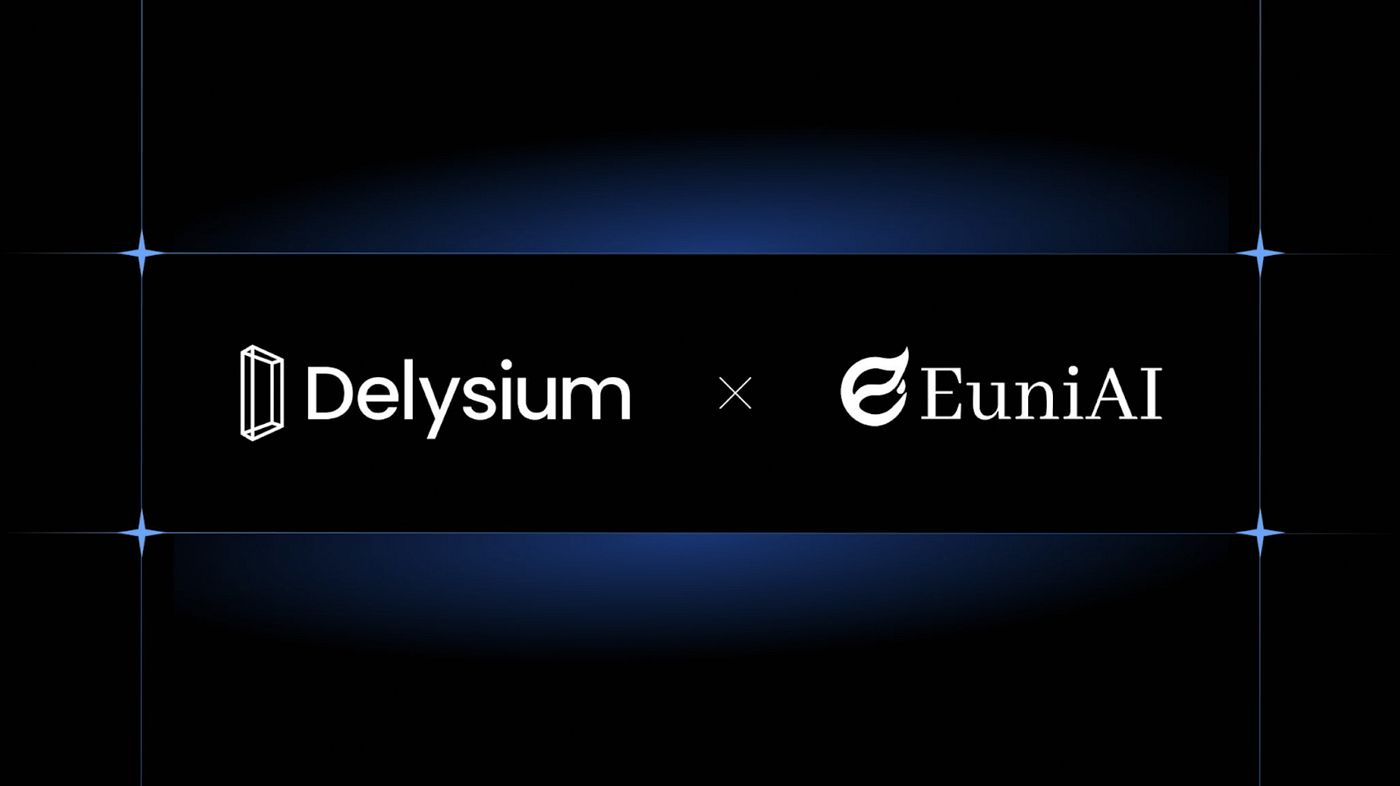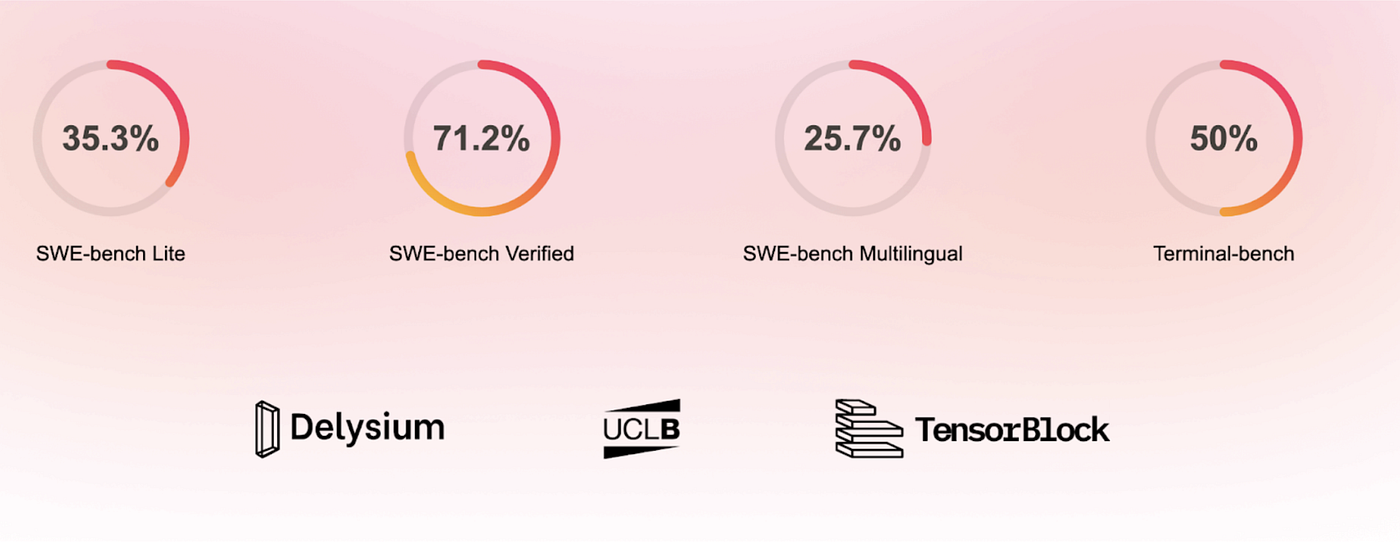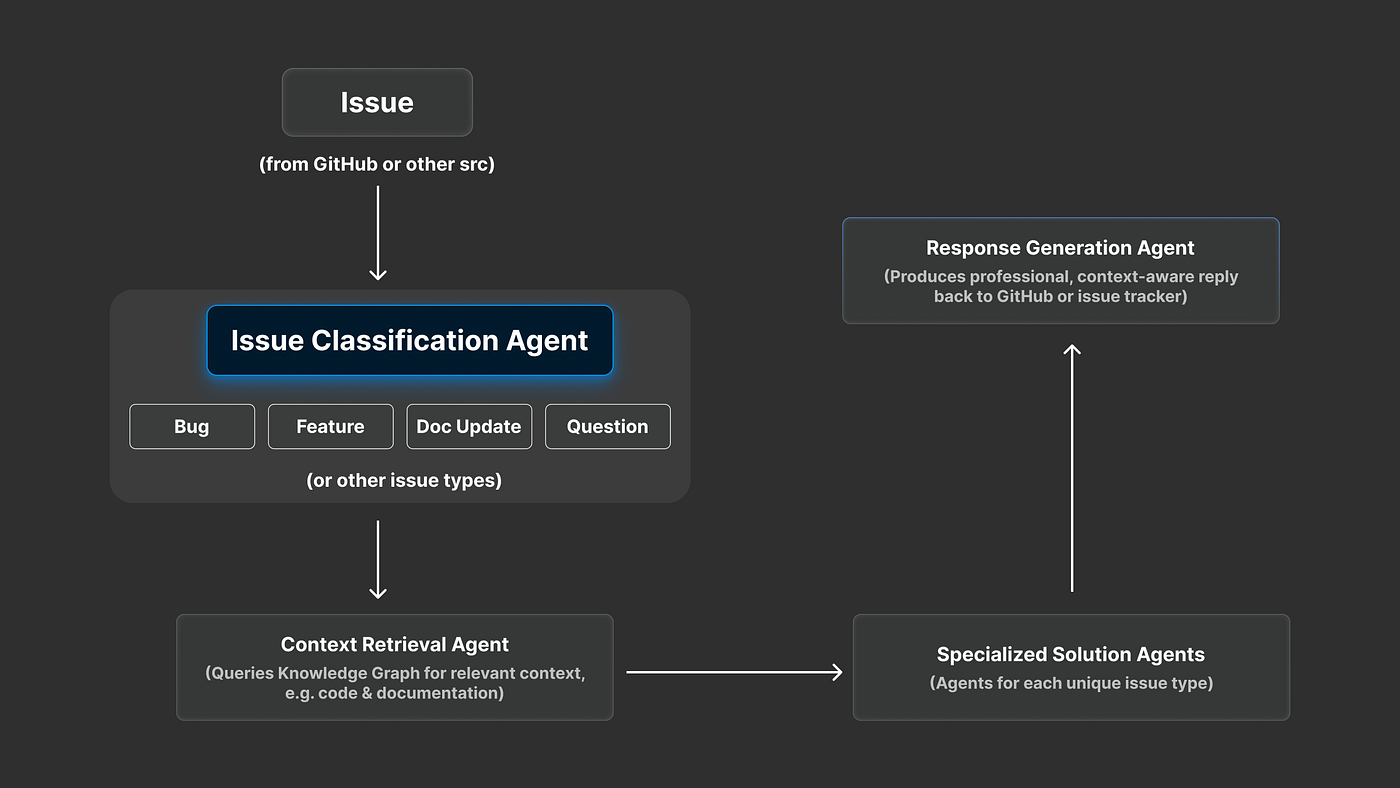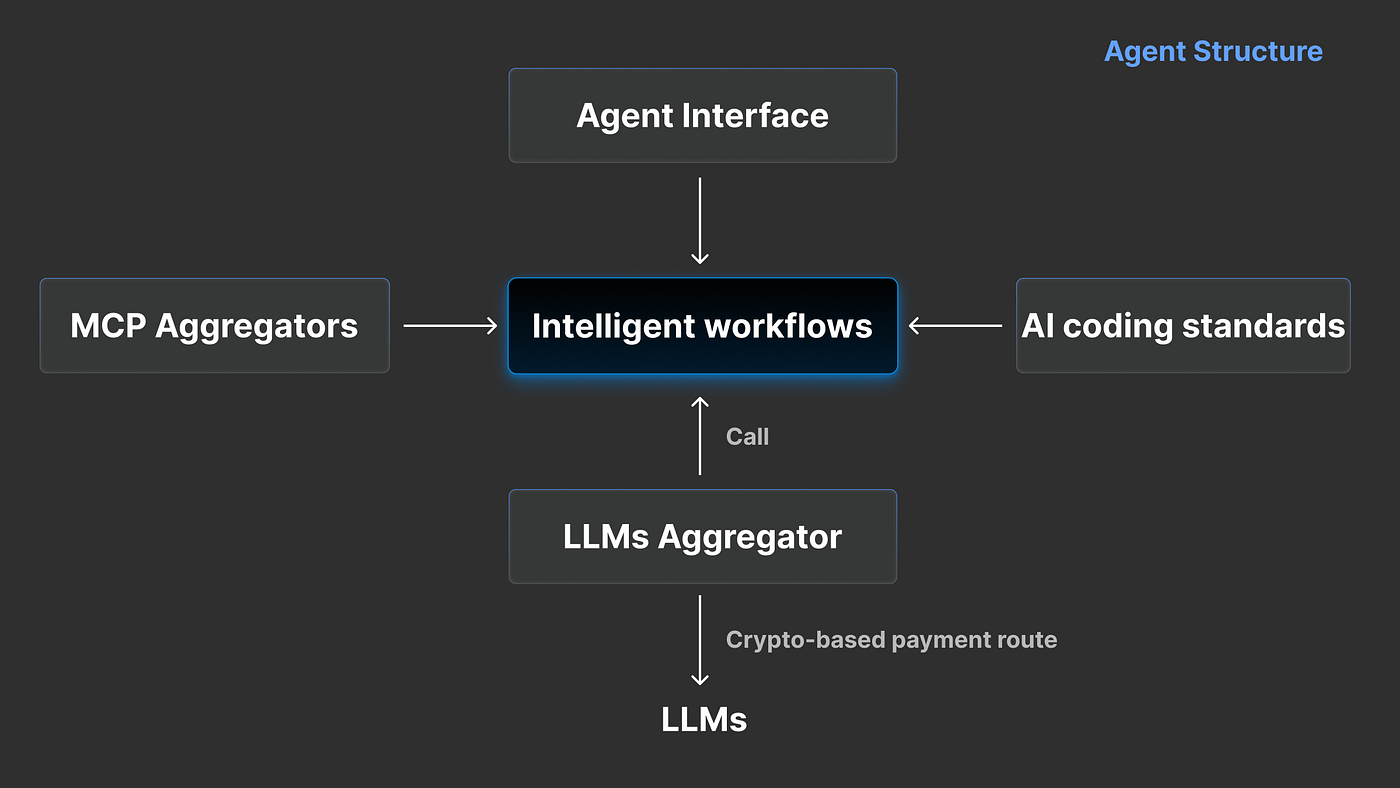Delysium Partners with UCL Software Systems Engineering Team to Pioneer Open, Autonomous, Multilingual, and Cost-Effective AI Coding Standards
Brief
The current landscape of academic and industrial code agents remains highly fragmented. Existing solutions often lack open-source accessibility, require significant human oversight, or are constrained to narrow functionalities — such as multi-repository retrieval, multilingual processing, or limited issue resolution.
Delysium is proud to announce its official partnership with Dr. He Ye of the University College London (UCL) Computer Science Department, aiming to revolutionize software engineering through open, fully autonomous, multilingual, and cost-efficient AI coding standards.
Leveraging Delysium’s deep expertise in the LLM ecosystem and technical community, this collaboration has launched Prometheus, a multi-agent system that transforms an entire code repository into a unified knowledge graph to guide context retrieval for issue resolution (arXiv: www.arxiv.org/abs/2507.19942).
A key objective of this partnership is to release openly trained models to the global Delysium community, helping to significantly reduce LLM operational costs. Furthermore, Delysium will continue working alongside the EuniAI (UCL SSE team) and leading industry partners to co-develop next-generation AI coding standards through unified codebase knowledge graphs, as well as contribute further top-tier research publications and other impactful outcomes.

New Method, Better Efficiency
Building on a strategic partnership to advance AI coding standards, Delysium and Dr. He Ye’s team are at the forefront of developing an innovative software engineering framework for large-scale, cross-language codebases. These pioneering methodology centers on the construction of a unified Knowledge Graph (KG), marking a milestone as the first to employ a graph-based approach for resolving issues across diverse code repositories.
This paradigm shift transforms vast, heterogeneous code assets — ranging from directory hierarchies and intricate syntactic constructs to related documentation and embedded comments — into an intelligent, interconnected graph. As a result, Delysium and Dr. He Ye’s team have introduced Prometheus, an open-source multi-agent system designed to abstract entire code repositories into cohesive knowledge graphs, thereby enhancing contextual information retrieval for effective issue resolution (arXiv: www.arxiv.org/abs/2507.19942).
Prometheus features a generic, language-independent architecture, enabling seamless integration of multilingual and multi-repository projects into a unified, intelligent framework. This abstraction unlocks a profound level of understanding, allowing automated tools to analyze and reason about code with exceptional clarity and depth.
Capable of operating at enterprise scale, Prometheus is engineered to handle and interpret even the most complex software ecosystems, establishing a robust foundation for next-generation intelligent development solutions. By transcending the boundaries of conventional techniques, this innovative framework delivers unparalleled context-aware capabilities, driving advancements in automated problem identification, localization, and resolution. Explore the open-source Prometheus system: https://github.com/EuniAI/Prometheus
As a solid use case of Prometheus technology that has already been adopted in the industry, euni.ai exemplifies how Prometheus-powered innovation can deliver real value.
Built on Prometheus and nurtured within UCL, euni.ai leverages advanced Prometheus capabilities to provide next-generation code analysis and automated bug resolution. By deeply understanding your code, euni.ai proactively identifies and fixes issues, empowering developers to build superior software with greater speed and efficiency.

Fully Automate AI Coding Issue Resolution
With the professional technical support of Delysium, Dr. He Ye’s team developed a cutting-edge multi-agent system to facilitate the resolution of a wide array of software issues, spanning various categories such as bugs, feature requests, discussions, and more, and accommodating multiple content formats including text, images, and video.
At the core of this advanced system lies a robust framework anchored by two foundational innovations, purpose-built to manage the intricate and diverse challenges inherent in modern software engineering. This approach is designed to automate the entire lifecycle of issue resolution, extending its capabilities far beyond the limited scope of conventional bug-fix mechanisms to encompass a comprehensive spectrum of development needs.
Here are the steps for outputs:
- All issues enter the system.
- The Issue Classification Agent categorizes the issue type.
- Issue is routed to the proper workflow/agent (Bug, Feature, Doc Update, etc.).
- The Context Retrieval Agent accesses the Knowledge Graph to extract relevant context (code, doc, etc.).
- Specialized solution agents handle the specific resolution process.
- The Response Generation Agent produces a final, professional reply for posting to the relevant platform.

Among these, there are 2 important parts: Deep Contextual Understanding and Adaptive Workflow.
1. Deep Contextual Understanding
At the heart of the system lies a dynamic Knowledge Graph (KG), meticulously engineered to deliver a nuanced and comprehensive understanding of every reported issue. This KG is systematically constructed by extracting in-depth contextual information from the codebase itself — including file structures, Abstract Syntax Trees (ASTs), and textual documentation. By mapping these diverse data sources into an interconnected graph, the system achieves holistic coverage of both code and related materials.
Orchestrating this process is a dedicated Context Retrieval Agent, responsible for navigating the Knowledge Graph to surface precise, semantically rich information. From pinpointing relevant code snippets to identifying key documentation, the agent ensures that all subsequent actions and decisions are grounded in robust, context-sensitive evidence.
2. Adaptive Workflow
Purpose-built for the multifaceted nature of software development, the system’s workflow goes far beyond the limitations of traditional, bug-centric solutions. The sequence begins with an advanced triage mechanism, where an Issue Classification Agent evaluates and categorizes each submission — be it a bug report, feature proposal, documentation update, or technical inquiry. This strategic assessment enables the system to dynamically allocate specialized agents and tailor problem-solving strategies to the needs of each unique scenario.
Such adaptability empowers the system to address a broad spectrum of developer requirements, whether that means reproducing intricate bugs or delineating new feature specifications. Ultimately, all investigative and generative remedial efforts converge through a Response Generation Agent, which synthesizes a clear, context-aware response for the original GitHub issue — effectively communicating the underlying analysis, actions undertaken, and resolutions achieved.
The Future of AI Coding: Really Solves, Not Just Suggests
Although research in code agents like SWE-agent and OpenHands is making strides on benchmarks such as SWE-bench, commercial products remain expensive and shrouded in opacity — Claude Code is one such example, promising automated issue management without open-source transparency. Multiple querying rounds required by these agents, such as those based on Claude-Opus-4 ($1,500 for 500 SWE-bench evaluations), drive up token consumption and slow responses.
Interestingly, mainstream systems heavily favor Python while providing little support for other programming languages. Most industrial solutions focus on bug fixing, leaving out categories like feature requests, documentation, and Q&A. IDE extensions (e.g., GitHub Copilot), specialized platforms (like Cursor), and foundational models (such as ChatGPT) now populate the landscape, yet AI-driven coding assistants largely empower the development workflow only during the coding phase — developers must still verify their suggestions, so autonomous resolution remains elusive.
Context limitation poses another major hurdle: Retrieval strategies tend to operate at a single file or repo level, making cross-repository reasoning and dependency analysis for complex systems a challenge. Efficiency and cost intensify these difficulties — queries can be slow and expensive, and agent operations involve high resource usage.
Despite rapid advancement in AI tools for programmers, progress is hampered by fragmented support for languages, narrow issue types, steep operational costs, and a lack of solutions for comprehensively navigating context across vast codebases.
Here is a simple mapping for the current AI coding status.
Pros
Boosts Efficiency
- AI tools can provide smart code suggestions
- Automates repetitive programming tasks
Accelerates Coding Workflow
- Reduces manual effort in code writing
- Speeds up developer productivity
Promises Autonomous Issue Management
- Commercial AI agents (e.g. Claude Code) start to address automatic resolution (though only partially effective)
Platform Accessibility
- Wide integration (IDE plugins, specialized platforms like Copilot, Cursor, etc.)
Cons
Context Limits
- Retrieval usually limited to a single file or repository
- Lacks advanced cross-repository reasoning and dependency analysis needed for complex codebases
Language Support Bias
- Major support for Python
- Minimal accommodation for other programming languages
Issue Diversity Narrow
- Most research and products focus only on bug fixing
- Feature requests, documentation, Q&A types are underrepresented
Cost & Efficiency Problems
- Agents consume many tokens (resource-heavy)
- Slow response time and expensive (Claude-Opus-4: e.g. $1,500 for 500 issues)
- Commercial solutions are costly and lack open-source transparency.
Breaking Boundaries: Uniting Academic Excellence and Industry Leadership
University College London (UCL) stands as one of the world’s foremost AI research universities, renowned for pioneering academic collaborations such as its comprehensive partnership with DeepMind, which produced the influential Deep Learning Lecture Series for Artificial Intelligence. The Computer Science department at UCL consistently ranks among global leaders in artificial intelligence, software engineering, systems, and multimodal research, with a distinguished track record of top-tier publications and interdisciplinary impact.
Dr. He Ye leads an innovative AI&SSE team within UCL Computer Science, dedicated to advancing system-level breakthroughs in automated software engineering. The team’s research focuses on codebase context retrieval, enhancing the capabilities of large language models, automating issue resolution, and developing effective memory architectures for code agents. These core technologies have been successfully validated through open-source collaboration with Delysium and have reached state-of-the-art performance on the SWE-bench benchmark, demonstrating both rigorous methodology and production-grade engineering excellence.
These core technologies have been successfully validated through open-source collaboration with Delysium and have reached state-of-the-art performance on the SWE-bench benchmark, demonstrating both rigorous methodology and production-grade engineering excellence. GPT-5 + Pass@1 Top-2 on SWE-Bench Verified! Prometheus hit 71.2% resolve rate, ranking #8 globally — just behind OpenHands.

On the industry side, Delysium has established itself as a pioneer in blockchain-powered AI agent networks since 2022. Its initiatives include Lucy (www.lucyos.ai), an agentic operating system for the crypto space that enables users to create, deploy, collaborate, and distribute agents using natural language. Delysium also introduced the You Know I Love You (YKILY) Network, a digital-native financial infrastructure for AI agents that facilitates orchestration via MCP aggregators among multiple agents, APIs, external services, and models in an open, composable, and expansively extensible ecosystem.

As a core partner, Delysium is dedicated to advancing the issue resolution capabilities of AI agents and enhancing use case evaluation across both AI and crypto domains. Through the establishment of this framework and the joint development of AI coding standards with UCL, Delysium empowers Lucy with foundational capabilities — enabling the general agent to operate in a broader range of scenarios.
This includes areas such as agent-based crypto coding and development, agent-driven trading, LLM portals that support crypto payment, MCP aggregators for both traditional and crypto servers, and more. These efforts collectively drive progress toward the You Know I Love You (YKILY) Network, a digital-native infrastructure purpose-built for AI agents.
From Now to The Future
Standing at the threshold of a new era in software engineering, the partnership between Delysium and Dr. He Ye transcends technical convergence, representing an orchestration of vision, philosophy, and commercial acumen. In a landscape often fragmented by proprietary silos and academic abstraction, this alliance endeavors to weave an open, autonomous, multilingual, and cost-effective tapestry — one where code agents do not merely suggest, but resolutely solve.
The commercial implications are profound. Harmonizing UCL’s academic rigor alongside Delysium’s pioneering spirit in blockchain AI agent networks lays a foundation upon which the next wave of digital transformation is to be built. The work undertaken today is not merely for the moment, but for the unfolding of a future in which autonomous agents emerge as creative partners, liberating developers from the drudgery of debugging and propelling them toward higher-order innovation.
In this ambitious journey, progress is not passively followed; it is actively shaped. The world anticipates systems capable of reasoning, collaboration, and adaptation across domains. With unwavering conviction, the future of AI coding is not a distant horizon, but a reality in the making — each bold line of code forging the path ahead.
About Delysium
Delysium ($AGI) is building a blockchain-based collaboration network for AI agents, including Lucy (www.lucyos.ai) — agentic operating system, and You Know I Love You (YKILY) Network — digital native financial infrastructure for AI agents.
Alongside Microsoft, Google, Nvidia, and other prominent pioneers in the AI industry, Delysium has received substantial support from prestigious organizations worldwide, including Y Combinator, Galaxy Interactive, Republic Crypto, Immutable, Polygon, Antalpha Ventures, GSR, and Blockchain Coinvestors.
- Delysium Website: www.delysium.com
- Delysium Whitepaper V2: delysium.gitbook.io
- X (formerly Twitter): x.com/The_Delysium
- Telegram: t.me/TheDelysium
- Discord: discord.gg/thedelysium